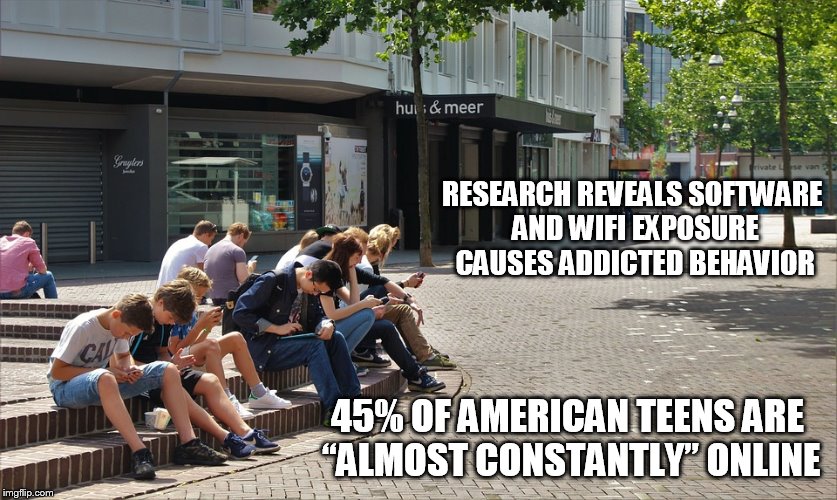 By B.N. Frank
By B.N. Frank
American tech insiders (aka “Silicon Valley Parents”) have reportedly been sending their kids to low-tech and no-tech schools, making their nannies sign “no screens” contracts, and spying on their nannies to make sure they aren’t breaking “no screens” contracts for several years already (see 1, 2, 3, 4)! Of course, additionally, for years already, research has continued to reveal that screen use in itself (see 1, 2, 3, 4) as well as for using social media is harmful to kids in numerous ways. In fact, last year, lawsuits were filed against TikTok for contributing to the deaths of two American children. Perhaps more recently published research will validate what many of us have suspected all along.
From StudyFinds.org:
Hooked on ‘likes’: How social media can completely ‘rewire’ children’s brains
CHAPEL HILL, N.C. — Here’s one more reason to limit the amount of time your child is spending in front of a screen. Social media could be reprogramming children’s brains and making them hooked on “likes,” a new study out of the University of North Carolina reveals.
Apps such as Instagram or TikTok could be making teenagers almost constantly checking their phones to see if they have positive or negative reactions to their online posts, experts say. The more young people check social media, the more sensitive they become to “social feedback” in the form of likes and comments, psychologists said.
Social feedback includes social rewards and punishments such as thumbs up and down, tagging, reporting content or star ratings. This increasing anticipation and sensitivity to receiving these kind of responses makes it hard for adolescents to fight the urge to check their accounts, according to researchers.
“Our findings suggest that checking behaviors on social media in early adolescence may tune the brain’s sensitivity to potential social rewards and punishments,” their paper, published in JAMA Pediatrics explains. “Individuals with habitual checking behaviors showed initial hypoactivation but increasing sensitivity to potential social cues over time, those with non-habitual checking behaviurs showed initial hyperactivation and decreasing sensitivity over time.”
During adolescence the brain experiences “significant structural and functional reorganization changes,” making it a crucial period of development. “Neural regions involved in motivational relevance and affective become hyperactive, orienting teens to rewarding stimuli in their environment, particularly from peers,” the authors say.
Nearly half of children admit they check social media ‘almost constantly’
The researchers studied 178 children (who were age 12 at the beginning of the study) from three public middle schools in North Carolina. Each participant reported how often they checked the popular social media platforms Facebook, Snapchat and Instagram. They then took part in a Social Incentive Delay task where their brain responses were measured when they were anticipating receiving social rewards and avoiding social punishments.
Results show that 78 percent of 13 to 17-year-olds report checking their devices at least hourly each day and 46 percent say they check them “almost constantly.”
“Social media platforms provide adolescents with unprecedented opportunities for social interactions during a critical developmental period when the brain is especially sensitive to social feedback,” the study concludes. This longitudinal cohort study suggests that social media behaviours in early adolescence may be associated with changes in adolescents’ neural development, specifically neural sensitivity to potential social feedback.
“Further research examining long-term prospective associations between social media use, adolescent neural development, and psychological adjustment is needed to understand the effects of a ubiquitous influence on development for today’s adolescents,” they add.
The study was supported by a National Institutes of Health grant and the Winston Family Foundation.
Report by South West News Service Alice Clifford.
Study Finds sets out to find new research that speaks to mass audiences — without all the scientific jargon. Study Finds has been writing and publishing articles since 2016.
Activist Post reports regularly about social media and unsafe technologies. For more information, visit our archives and the following websites:
Become a Patron!
Or support us at SubscribeStar
Donate cryptocurrency HERE
Subscribe to Activist Post for truth, peace, and freedom news. Follow us on SoMee, Telegram, HIVE, Flote, Minds, MeWe, Twitter, Gab, What Really Happened and GETTR.
Provide, Protect and Profit from what’s coming! Get a free issue of Counter Markets today.


Be the first to comment on "New University Study Says Social Media Use is “reprogramming children’s brains”"